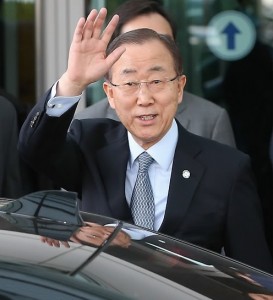- California Assembly OKs highest minimum wage in nation
- S. Korea unveils first graphic cigarette warnings
- US joins with South Korea, Japan in bid to deter North Korea
- LPGA golfer Chun In-gee finally back in action
- S. Korea won’t be top seed in final World Cup qualification round
- US men’s soccer misses 2nd straight Olympics
- US back on track in qualifying with 4-0 win over Guatemala
- High-intensity workout injuries spawn cottage industry
- CDC expands range of Zika mosquitoes into parts of Northeast
- Who knew? ‘The Walking Dead’ is helping families connect
Ban’s S. Korean presidential bid rumors flare up amid planned N. Korea trip
SEOUL (Yonhap) — Speculation of U.N. Secretary-General Ban Ki-moon’s presidential bid in South Korea has resurfaced after news reports on his possible visit to North Korea.
Ban’s spokesman said earlier this week that discussions are under way regarding a constructive role he might play in the Korean Peninsula situation and that talks are under way to set up what would be the secretary general’s first visit to the North.
Ban, a former South Korean foreign minister, has been voted as one of the most popular possible contenders, though he has disavowed rumors that he has interest in running in the 2017 presidential election.
He has repeatedly said he is not interested in South Korean politics, noting that he wants to spend time taking care of his grandchildren after his retirement.
In May, Ban’s now-scrapped visit to the inter-Korean industrial complex in North Korea’s border city of Kaesong first sparked speculation in the country that it could be the beginning of a political campaign ahead of the election.
At the time, the secretary-general stressed that the visit is only aimed at helping improve South-North relations and has no other purpose.
Rumors again circulated in September when Ban and President Park Geun-hye exchanged public messages in support of each other at the U.N. during her visit to New York.
During the visit, Park unveiled her commitment to making contributions to the sustainable development agenda and the U.N. climate change conference, the two major issues pushed by Ban.
The apparent rapport between the two leaders and Ban’s active support of Park in the U.N. rekindled the rumor of Ban’s possible candidacy.
“It is true that Secretary-General Ban is receiving public support,” said a sitting lawmaker of pro-Park faction, requesting anonymity.
“I think (Ban) has enough potential to be a candidate that our people would like,” said Rep. Hong Moon-jong of the Saenuri Party during an interview with a local radio station last month.
Some others are being cautious, saying that Ban’s recent moves to visit North Korea should not be translated politically.
“I believe Ban’s moves are aimed at relieving South-North tensions and for the peace on the Northeast Asia,” said another ruling-party lawmaker.
They also contend that adapting to local politics is not easy, adding that Ban has to go through further moral verification.
Earlier this year, Ban denied reports that he was politically linked to a South Korean businessman, who committed suicide after leaving a note suggesting that some of President Park’s aides took bribes from him, including her now-retired prime minister, Lee Wan-koo.
The latest poll showed that Ban received 21.1 percent of public support, followed by Kim Moo-sung, chairman of the ruling Saenuri Party, and Moon, chairman of the main opposition New Politics Alliance for Democracy, with 14.1 and 11.2 percent, respectively.
Ban’s second five-year term at the U.N. is set to end at the end of 2016, a year before South Koreans go to the polls to elect a new president who will replace Park.
Park’s single five-year term ends in early 2018, and by law, she cannot seek re-election.

















Pingback: Is Ban Ki-moon’s Possible North Korea Trip A Prelude to ROK Presidential Run? | ROK Drop
Pingback: The Internationalist » The Race to Be UN Secretary-General: Five Questions for the Candidates